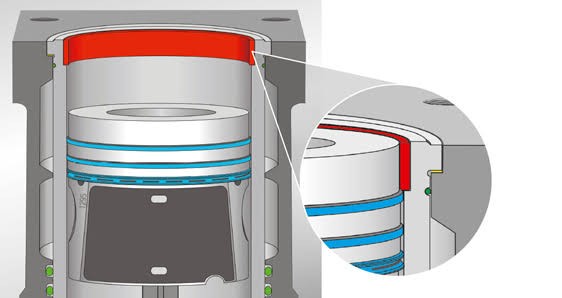Discover the importance of fire rings in cylinder liners for automotive engines. Learn how fire rings prevent oil carbon deposits, enhance engine performance, and prolong engine life.
In modern automotive engines, cylinder liners play a crucial role in ensuring optimal performance and efficiency. One critical component within these cylinder liners is the fire ring. Placed at the top end of the cylinder liners in a rectangular recess, the fire ring serves a vital purpose in preventing the formation of hard oil carbon deposits on the piston's top land. In this comprehensive guide, we will delve into the significance of fire rings, their function, and how they contribute to the overall efficiency and longevity of automotive engines.
Understanding Fire Rings in Cylinder Liners:
Fire rings, also known as oil scraper rings, are precision-engineered components inserted loosely into designated recesses at the top end of cylinder liners during mounting. Once the cylinder head is assembled, the fire ring is held securely in place. The primary objective of the fire ring is to prevent the accumulation of hard oil carbon deposits on the top land of the piston, which can have detrimental effects on engine performance and longevity.
Preventing Oil Carbon Deposits:
The presence of oil carbon deposits in the combustion chamber can lead to various engine issues, including reduced power output, increased fuel consumption, and decreased engine efficiency. The fire ring plays a vital role in combating this problem by having a smaller inside diameter compared to the cylinder bore diameter. This design feature ensures that the fire ring effectively scrapes off excess oil from the cylinder walls as the piston moves up and down, preventing carbon buildup on the piston's top land.
Benefits of Fire Rings in Automotive Engines:
- Improved Engine Performance: By preventing oil carbon deposits, fire rings contribute to smoother piston movement, reducing friction and enhancing overall engine performance.
- Increased Fuel Efficiency: A cleaner combustion chamber translates to better fuel combustion, leading to improved fuel efficiency and lower emissions.
- Prolonged Engine Life: The absence of carbon deposits reduces wear on vital engine components, thereby extending the engine's lifespan.
- Enhanced Reliability: Fire rings promote consistent engine operation, minimizing the risk of unexpected breakdowns and costly repairs.
- Reduced Maintenance Costs: With fewer carbon-related issues, vehicle owners can enjoy reduced maintenance and repair expenses over time.
Maintenance and Inspection of Fire Rings:
To ensure optimal performance, it is essential to include fire rings in routine engine maintenance and inspection procedures. Regularly inspecting the fire rings for signs of wear, damage, or misalignment will help identify potential issues before they escalate. If any abnormalities are detected, promptly replace the fire rings to maintain the engine's efficiency and reliability.
Conclusion:
Cylinder liners with fire rings are a critical component in modern automotive engines. Their role in preventing oil carbon deposits and ensuring smooth piston movement significantly contributes to engine performance, fuel efficiency, and overall longevity. Regular maintenance and inspection of fire rings are essential to keep engines operating optimally. With fire rings in place, automotive engines can deliver the power, efficiency, and reliability that motorists rely on every day.

Comments (0)
Please login to join the discussion
Be the first to comment on this article!
Share your thoughts and start the discussion